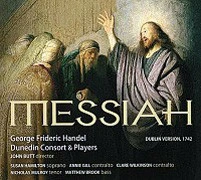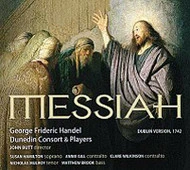 Choosing to perform Handels Messiah in the version presented at its very first performances, in Dublin (13 April and 3 June, 1742), does not mean presenting the work in its best or indeed in its entirely original form. Handel seems to have composed the oratorio with no specific performers in mind, so he was prepared to adapt it for each production in turn; indeed, around ten versions are discernible in all. He certainly made some revisions in Dublin for those singers who were not of the same caliber as he enjoyed in London, so there has sometimes been a tendency to view this first performing version as critically compromised by supposedly inadequate forces. Nevertheless, there is much to be gained from reconstructing the Dublin version (albeit something which cannot be done with total certainty) and, particularly, attempting to use roughly the same size of vocal forces and a similar apportionment of soloists. Some of Handels cuts made during the preparations for the Dublin performances were clearly designed to enhance the flow of the piece; these were retained in subsequent performances and thus do not reflect the inadequacy of the first performers.
Choosing to perform Handels Messiah in the version presented at its very first performances, in Dublin (13 April and 3 June, 1742), does not mean presenting the work in its best or indeed in its entirely original form. Handel seems to have composed the oratorio with no specific performers in mind, so he was prepared to adapt it for each production in turn; indeed, around ten versions are discernible in all. He certainly made some revisions in Dublin for those singers who were not of the same caliber as he enjoyed in London, so there has sometimes been a tendency to view this first performing version as critically compromised by supposedly inadequate forces. Nevertheless, there is much to be gained from reconstructing the Dublin version (albeit something which cannot be done with total certainty) and, particularly, attempting to use roughly the same size of vocal forces and a similar apportionment of soloists. Some of Handels cuts made during the preparations for the Dublin performances were clearly designed to enhance the flow of the piece; these were retained in subsequent performances and thus do not reflect the inadequacy of the first performers.The challenge in this recording has been to try and recapture something of the freshness of the first public performances of Messiah, imagining what it was like to hear the work for the very first time when many moments must have been quite unexpected. By analyzing the lists of adult singers in the two cathedral choirs and subtracting the number who were likely to have been ordained (and thus excluded from secular performances) Donald Burrows has suggested that the original chorus probably consisted of no more than three or four voices to a part. This certainly allows the capitalization of the existing strengths of the Dunedin Consort, which comprises singers who are equally adept at solo, ensemble and choral singing. Thus the solo areas are apportioned in more or less exactly the way Handel did.
Hailed by the critics as "a group that has done so much to transform the vocal life of Scotland", the Dunedin Consort is a dynamic vocal ensemble that has rapidly established itself at the forefront of professional singing in Britain. Founded by Ben Parry and Susan Hamilton, a native of Edinburgh and soloist with many professional ensembles, its aim is to provide not only the Scottish community with a vocal group of outstanding quality, but also Scotland with an international touring group capable of world-class performances.
"Glowingly sung and recorded" - Daily Telegraph
Features:
Super Audio CD
SACD Multi-Channel SACD Layer
SACD Stereo SACD Layer
This Hybrid SACD contains a Super HDCD 24 Bit encoded Stereo CD layer which is playable on most conventional CD Players!
Musicians:
Dunedin Consort & Players
John Butt, Director
Susan Hamilton, soprano
Annie Gill, contralto
Clare Wilkinson, contralto
Nicholas Mulroy, tenor
Matthew Brook, bass
Selections:
Georg Friedrich Handel (1685-1759)
The Complete Messiah (Dublin Version, 1742)
Total Time: Disc 1 - 76:37, Disc 2 - 63:28
Recorded at Greyfriars Kirk, Edinburgh, UK: 1-4 May 2006
Product Reviews:
Nicholas Anderson, BBC Music Magazine - December 2006 issue
The Dunedin artists are stylish, fresh sounding in their choral singing and often more intimate than other versions in their manner of communication. Susan Hamilton's solo contributions are outstanding. This is a softly spoken recording, further underlined by Handel's restrained scoring for strings, trumpet and drums. Performance * * * * / Sound * * * *
The Guide, New Zealand - November 2006
George Frideric Handel’s Messiah is a dauntingly beautiful oratorio. Like any of the truly great classical operatic pieces, so many versions exist – so where to start? Well, right here seems as good a place as any; under the direction of John Butt, this Scottish ensemble has attempted to recreate the version of Messiah as presented at its debut performances in Dublin (13 April and 3 June, 1742). Linn Records has a fine reputation for superior sound-quality and these recordings are flawless; Susan Hamilton (soprano) and Annie Gill (contralto/mezzo-soprano) really shine. Nicholas Mulroy’s crisp, bold tenor announces itself proudly and there’s almost a jazz-like interplay between the massed voices and the thread of violins, viola, cello and double-bass. But of course, through percussive passages, dense vocal cadences and diversions in to almost Bach-like harpsichord baroque-ness, it is the actual work Messiah that is the star here – the religious dedication of Handel has never sounded finer. And for those wishing to move in to the operatic genre, this is a perfect introduction – the power and the glory are truly well represented with this double-disc set. It may not be the definitive version (that might in fact never exist) but quality-wise and for subtle intensity, this new interpretation evokes the history and sense of myth as well as providing a very clear reading of a seminal classical piece.
David Vickers, Gramophone - December 2006 issue
For an infinitely more rewarding fresh look at Handel's most familiar music, look no further than the Dunedin Consort's performance of Handel's first version, premiered at Dublin in 1742. Bizarrely under-represented in concert and on disc, the Dublin score contains some fascinating music that Handel never reused, such as the substantial chorus 'Break forth into joy'. The exuberant direction by harpsichordist John Butt is meticulously stylish and utterly devoid of crassly pretentious egotism. The playing is unerringly spontaneous and dramatically integrated with singers who illustrate profound appreciation of text. Clare Wilkinson's 'He was despised' is most moving, Susan Hamilton effortlessly skips through a delicious 'Rejoice greatly', and bass Matthew Brook sings as if his life depends on it.
Butt bravely resolves to use the same forces Handel had at his disposal in Dublin, which means that the entire oratorio is sung by a dozen singers (with all soloists required to participate in the choruses, as Handel would have expected). Where this approach might risk worthy dull solos churned out by stalwart choir members, the Dunedin Consort's exemplary singers produce virtuoso choruses that are theatrically charged, splendidly poised and exquisitely blended. Old warhorses 'For unto us a child is born' and 'Surely he hath borne our griefs' are delightfully inspiring. Butt and the Dunedin Consort marry astute scholarship to sincere artistic expression and the result is comfortably the freshest, most natural, revelatory and transparently joyful Messiah I have heard for a very long time.




 Turntable Accessories
Turntable Accessories Headphone Accessories
Headphone Accessories Cable Accessories
Cable Accessories Vinyl Accessories
Vinyl Accessories Compact Disc Accessories
Compact Disc Accessories







